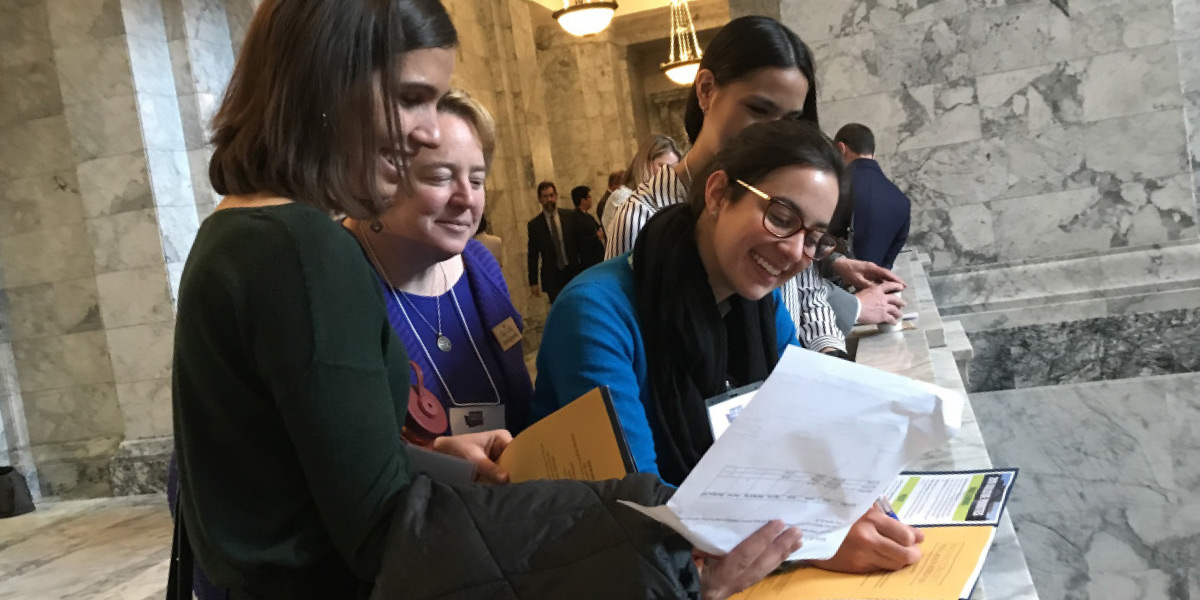
WRITTEN BY SALLY JAMES
New laws and policy changes favored public health during the 2019 session of the Washington State Legislature – the best year in nearly a decade for public health gains. Many advocates from the UW School of Public Health (SPH) have worked for years, in a variety of ways, to champion these changes.
FOUNDATIONAL PUBLIC HEALTH SERVICES
A key policy win establishes a literal “foundation” of health as a public expectation. Known as Foundational Public Health Services, these are sometimes compared to a 911 system, which works essentially the same everywhere in the state. Leaders of the Washington State Association of Local Public Health Officials, along with State Secretary of Health John Wiesman, worked for years to establish this bedrock of services, which includes communicable-disease monitoring and vaccination.
“Washington and Oregon lead the nation in this field, and this legislation could serve as a model for other states,” said Betty Bekemeier, director of the School’s Northwest Center for Public Health Practice and member of a Foundational Public Health Services policy advisory committee.
Before the law and without this focus on foundation, she added, “You could drive across the state and not be certain that our public health system could consistently and adequately meet basic local needs for things like responding to pertussis or food-borne illness outbreaks.”
Said Aaron Katz, principal lecturer in health services, “The pedigree for foundational health goes back as far as 1993, when the legislature mandated a biennial public health improvement plan.” Many financial problems, in addition to the 2008 recession, took vital funds away from county health departments across Washington, he said. Foundational Public Health Services will restore some, but not all, of those dollars. Katz said it may take years to build up an infrastructure that adequately protects communities from epidemics, food-borne illnesses and other risks because the public health system has lacked this funding for so long.
TOBACCO
In one of the biggest wins for public health, lawmakers raised the age for use of tobacco products from 18 to 21, potentially rescuing tens of thousands of teens from beginning a habit that could shorten their lives. Washington joins 17 other states and Washington, D.C., in restricting tobacco use to age 21 and over. The law takes effect Jan. 1. While a huge win for public health, State Rep. Gerry Pollet, D-Seattle, and an instructor for SPH, warned that vaping and use of e-cigarettes are continuing health risks. He successfully sponsored a bill – approved in the final hours of the session – to create a tax on vapor products.
The measure is expected to raise more than $19 million over two years, with half the money going to cancer research and half to a new fund for foundational public health services. Five percent of the latter account will be earmarked for the School to train public health professionals.
VACCINE EXEMPTION
The state made it more difficult for parents to claim exemptions from the recommended MMR (measles, mumps and rubella) vaccination, which is required of children before entering public school. A national epidemic of measles cases, including an outbreak in southwestern Washington state, gave urgency to this bill. Parents can no longer claim a “philosophical/personal belief” reason for skipping the MMR vaccination, but must have a medical or religious reason.
MATERNITY, VITAL DATA, PUBLIC OPTION
The health of new mothers and pregnant women got a boost from the establishment of a monitoring function to track deaths, according to Bekemeier. Deaths during pregnancy, during delivery of babies and postpartum for up to a year will be tracked. The bill establishes a formal review process for maternal deaths, which have been on the rise, and mandates a report to the legislature every three years.
Two other issues won changes based on requests directly from the Washington State Department of Health. These were new rules on how records are kept on births and deaths, known as Vital Records, and changes that create and fund a medical marijuana database.
One of the most talked-about legislative changes was creation of a “public option” for insurance to pay for health care. Available in 2021, the option is expected to offer lower premiums by having the state contract with private insurers to bundle coverage efficiently. Consumers would use the Health Benefit Exchange, the state’s insurance marketplace, to buy the plans.
GUN VIOLENCE
Washington state awarded $1 million to the University of Washington for the formation of the Firearm Injury & Policy Research Program, based at the Harborview Injury Prevention & Research Center. Experienced firearms researchers at UW Medicine and SPH will lead the program. Washington joins two other states – New Jersey and California – that have funded firearms research. Additionally, Washington voters last fall overwhelmingly approved an initiative that sets new gun storage provisions while expanding background checks and raising the minimum age to 21 for buying semiautomatic assault rifles.
PESTICIDES, DISPARITY
The legislature also created a working group to look at pesticides and pesticide safety, according to Marty Cohen, assistant chair of stakeholder engagement for the School’s Department of Environmental & Occupational Health Sciences (DEOHS). And lawmakers created a Health Energy Worker group, which Cohen will lead, aimed at benefiting workers at the Hanford nuclear reservation.
Finally, the state created an environmental health disparities map with help from DEOHS and other entities. The map provides policymakers and others a tool to shape investments to reduce environmental health impacts on Washington communities.